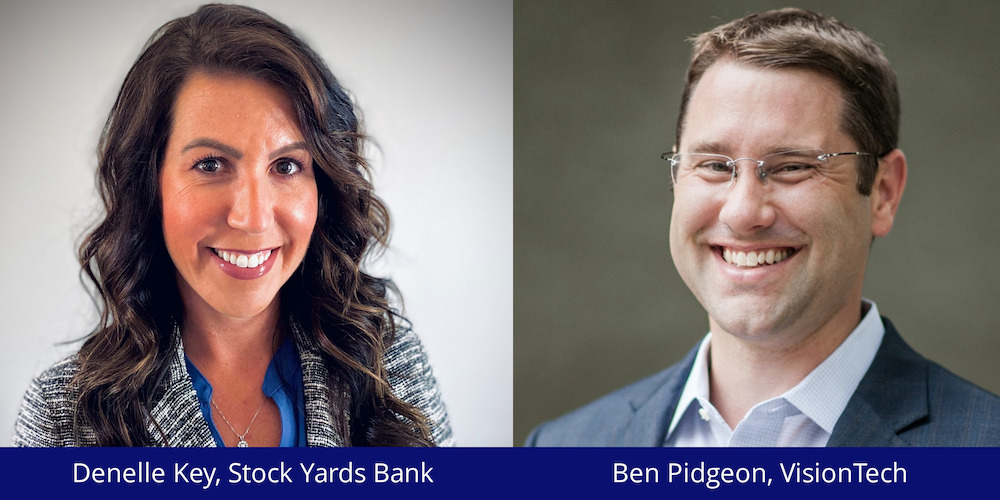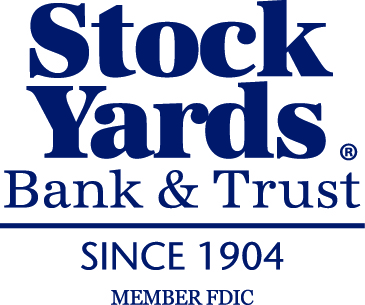On Friday, March 10, 2023, Silicon Valley Bank (SVB), the flagship of the startup banking world, collapsed, causing the FDIC to take over the bank. The failure is the largest since 2008, and it caused a firestorm among customers, the startup and venture ecosystem, policy makers, and politicians. Fanning the flames were media and social platforms, raising the bar on histrionics. It was no wonder that many people dreaded the Monday after. And yet SVB reopened on Monday under the control of the newly created Deposit Insurance National Bank of Santa Clara. Insured depositors with up to $250,000 in their accounts were able to access their money.
So what next? Although the fallout from SVB’s failure is still unfolding, VisionTech turned to Stock Yard Bank’s Denelle Key for insight. She offered five reasons why startups should go local with their banking and return to personal banking relationships. – Ben Pidgeon, VisionTech Executive Director

BP: How are you handling Friday’s news of Silicon Valley Bank’s crash?
DK: First off, this is nothing like the Lehman Brother collapse in 2008. My head is still spinning by how quickly SVB went into receivership. I think it’s the direct result of social media commentary, fearmongering and politicization that the FDIC felt it had to move quickly to avoid more devastating consequences. All weekend long I got calls from fearful bank customers and providing reassurance that Stock Yards Bank is sound, and their accounts are protected. Fortunately, the right people are stepping in to manage the immediate crisis of SVB and avoid the collapse of more banks.
BP: You’ve pointed to the media’s role, but is there another big difference from the financial crisis of 2008?
DK: Absolutely! There is a huge generational difference in how young startup founders and their teams – particularly those in the tech sector – have approached banking and the financial side of their businesses. I call them debit card kids. They’ve never handled real money. They don’t see it or deal with it. And they don’t understand the basic fundamentals of banking. They rely solely on the convenience of the Internet and apps for banking services. Most have never stepped foot in a bank. With everything moving so fast in the digital world, it’s easy to lose track of banking and money basics. When a startup CEO has a problem, they head back online as they have no idea what it means to pick up a phone, call their banker and get a real, thoughtful answer from a knowledgeable banker.
BP: You’re right about that. So what are the five reasons why startups should go local and return to personal banking relationships?
DK: Reason One is Experience. When you work with a local community bank, you’re working with people who have years of experience advising businesses on the fundamentals of banking, lending and growth. Startups often don’t know what they might need from a banking perspective, and in this environment, the needs change often. Utilizing a small bank allows you to find someone who has working with startups, has experience in your industry, and can speak to the needs of your business. Oftentimes, a startup thinks they need to go to a national bank as they’re going to be doing business on a national or international scale. The reality is that local banks such as Stock Yards is no different than a Bank of America in terms of having the experienced people, products, and services needed to doing business around the world.
BP: It seems like people automatically think large banks are too big to fail.
DK: That’s the assumption. Which is why Reason Two is Security. You need to know that your bank, regardless of size, is sound. Take SVB. Its 40,000 customers are mostly tech companies; big companies alike Shopify, Teladoc and ZipRecruiter. They provided services to around half of all U.S. startups. So if you are a startup CEO, it was pretty safe to assume SVB was a good, secure choice. Now we know that wasn’t the case, but why would you think otherwise?
A CEO of a startup or any other stage company should understand the strength of their bank and expect that their personal banker can speak to the bank’s performance. With a community bank, it’s more likely that you’ll find a well-capitalized, balanced bank with strong loan-to-deposit ratios. And if you don’t know why this is important to you as a startup, that’s okay! Ask questions! You want to ensure that your bank is sound, and your money is safe, as both are critical. You don’t want to come to work on Friday, looking forward to the weekend, and see your bank and accounts crashing.
BP: We’ve kind of gotten away from relationships with our bankers. Is that a fair assessment?
DK: That’s point three: We need to get back to connected relationships with our bankers. And I don’t mean connected in the LinkedIn sense. I mean pick up the phone, let’s have lunch, can you help me out here, I have a question kind of connection. Real relationships!
Startups, regardless of the age of their founder or CEO, need more than just an ATM, the internet, a debit card, and mobile deposit. You may think that banking and the services they provide are commodities, and you can get by with a digital relationship. However, the last three years have taught us that a relationship with a bank will save your company when hard time happen. During the COVID-19 pandemic, Paycheck Protection Program (PPP) funds distributed through large banks took weeks and weeks to process. Many companies didn’t receive funds simply because they were pushed to the end of the line. Community banks like Stock Yard were able to quickly take care of our clients’ needs because every client had a relationship with their banker. No stone was left unturned by bankers to help their customers. People and their businesses matter. While banking online is convenient, it’s also faceless. And that’s a real problem when problems crop up. A chatbot won’t cut it.
BP: It really get down to that human connection, right?
DK: Yep, human connection. So reason four is the ability to communicate with a person, and to trust that person. When you have an engaged banker, someone you’re comfortable talking things over with, this person knows your business and is prepared to problem solve for you. Bankers want to know your business, so we understand where you came from and where you want to go. There’s also a big difference between an employee who works at a bank, and a banker that is a true advisor to your startup or business. Your banker should also be accessible to you, and available to listen to your questions and issues. Having one person to be able to contact to troubleshoot and also brainstorm is a huge asset to a business owner and help you through them. Your job as a business owner is to generate revenue, not spend your time managing customer service issues with a bank. You should be able to easily reach your banker and trust their counsel.
BP: And the last reason to go local?
DK: Personal service from a bank and banker with whom you have an open, honest connection. Find a bank that makes you feel comfortable as a client. Even better, find one that makes you happy and valued to be there! Providing outstanding service in all of the ways I’ve mentioned help create and build strong, engaged relationships. You should feel great about the service you are receiving from your bank, know and trust your banker, know they are interested in helping you succeed, and feel comfortable having them as an advisor to your business. If any of these items fall short, it’s time to consider a new bank!
ABOUT STOCK YARDS BANK
Stock Yards Bank’s impressive history began in 1904. Since then, Stock Yards Bank has earned a reputation for personal service, financial strength, and a commitment to the highest standards of business ethics. We have a full range of financial services to meet the needs of each of our customers, regardless of the size or complexity of their needs. We’ve built our business in the simplest and most straightforward way possible: one account at a time, relationship by relationship.

Our mission statement calls for providing unsurpassed service to our customers and a great place to work for our employees. Our commitment to this philosophy is a key reason our parent company, Stock Yards Bancorp, a publicly traded company (NASDAQ:SYBT), has consistently ranked among the country’s top-performing community banks and recognized as one of the “Best Banks to Work For.” Learn more here.
